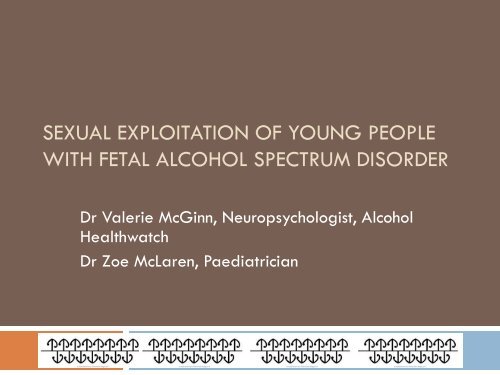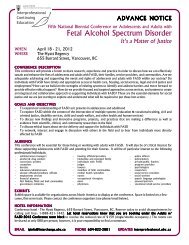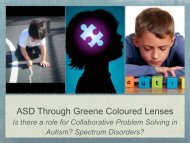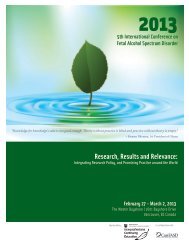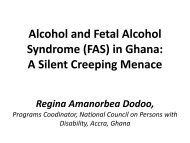Sexual Exploitation of Young People with FASD - UBC ...
Sexual Exploitation of Young People with FASD - UBC ...
Sexual Exploitation of Young People with FASD - UBC ...
You also want an ePaper? Increase the reach of your titles
YUMPU automatically turns print PDFs into web optimized ePapers that Google loves.
SEXUAL EXPLOITATION OF YOUNG PEOPLE<br />
WITH FETAL ALCOHOL SPECTRUM DISORDER<br />
Dr Valerie McGinn, Neuropsychologist, Alcohol<br />
Healthwatch<br />
Dr Zoe McLaren, Paediatrician
Introduction<br />
Clinicians working <strong>with</strong> young people who may have been<br />
sexually exploited<br />
Capacity to consent is the question<br />
Views range from paternalism to allowing the freedom to<br />
agree in any situation<br />
United Nations Declaration to maximum degree feasible<br />
disabled person has same rights as other human beings<br />
Our objective is to share cases and encourage discussion about<br />
how we can reach a balance while protecting from sexual<br />
exploitation yet ensure their human rights
Outline<br />
A case that may have been sexual exploitation depending on<br />
your point <strong>of</strong> view<br />
How can we prevent sexual exploitation?<br />
What is sexual abuse and sexual exploitation?<br />
Why are young people <strong>with</strong> <strong>FASD</strong> vulnerable?<br />
How does this impact on capacity to consent to sexual activity?<br />
How can the Law afford protection to young people <strong>with</strong><br />
<strong>FASD</strong>?<br />
A NZ case where young person <strong>with</strong> <strong>FASD</strong> was sexually<br />
exploited
Kelly<br />
16 ½ year old <strong>with</strong> 6 month daughter both in CYF care, living in residence,<br />
referred for capacity to parent child<br />
Heavy alcohol exposed, 4 th <strong>of</strong> 8 children, raised by grandparents from<br />
birth, well cared for but poorly supervised<br />
Floppy irritable baby, poor feeder sleeper, walked at 3, talked at 5<br />
Overactive, ADHD, slow learner, family opposed to ID services<br />
No reserve, overly friendly, go <strong>with</strong> anyone<br />
At school intrusive, no friends, thrived on one on one,<br />
Wanted own way, low stress tolerance, anger outbursts, couldn’t share cooperate,<br />
kind to and played <strong>with</strong> much younger kids<br />
At high school mainstreamed, taken advantage <strong>of</strong>, bullied<br />
Befriended by middle aged man at 14 years, 15 pregnant
<strong>FASD</strong> Assessment<br />
Caregiver reported short attention span, need to speak simply<br />
Does what she wants, puts self first, disregards needs <strong>of</strong> baby<br />
Thinks she can do everything independently but can’t care for self or baby,<br />
gets distracted, forgets, tries hard but wanders <strong>of</strong>f<br />
Loves her baby, would never deliberately hurt him but doesn’t think<br />
Gets easily angry and frustrated, shouts at him<br />
Taught routines but needs to be prompted and shown directly<br />
Not able to make friends, black and white, tells them <strong>of</strong>f<br />
Doesn’t think she was exploited, loves him and says they wanted a baby<br />
Staff say he dominates and controls her via txt and phone
<strong>FASD</strong> Assessment- 4 digit code 3334- Partial FAS<br />
Moderate growth retardation from birth records<br />
Moderate expression <strong>of</strong> FAS face, ABC score CCB<br />
High risk pattern <strong>of</strong> alcohol exposure<br />
Probable CNS damage<br />
Cognition: IQ 62<br />
Adaptive function; GAC 56<br />
Language Deficits, 8 year old level<br />
Memory Deficits<br />
Executive Dysfunction, impaired reasoning, structure dependent,<br />
dysregulated, confabulated, perseverative, rigid, can’t multitask<br />
With structure hard working and co-operative, literacy 9 years
Definition <strong>of</strong> sexual abuse<br />
<strong>Sexual</strong> abuse can be defined as:<br />
The forcing <strong>of</strong> unwanted sexual activity by one<br />
person on another, as by the use <strong>of</strong> threats or<br />
coercion AND/OR<br />
<strong>Sexual</strong> activity that is deemed improper or harmful,<br />
as between an adult and a minor or <strong>with</strong> a<br />
person <strong>of</strong> diminished capacity
Definition <strong>of</strong> sexual exploitation<br />
Not clear!<br />
No statutory definition <strong>of</strong> exploitation<br />
No judicial guidance exists as to its meaning<br />
Reeves: "taking unfair advantage <strong>of</strong> persons, their<br />
characteristics, or their situations.... A particular<br />
problem is the identification <strong>of</strong> exploitative<br />
transactions <strong>with</strong>in consensual exchanges.”<br />
The heart <strong>of</strong> the matter in the sexual exploitation <strong>of</strong><br />
young people <strong>with</strong> <strong>FASD</strong>.
Factors that increase vulnerability to sexual<br />
exploitation in ID (Graydon, 2006)<br />
Socialised to acquiesce<br />
Limited decision-making ability<br />
Easily manipulated<br />
Issues <strong>of</strong> dependency<br />
Limited knowledge about sex<br />
Limited knowledge <strong>of</strong> rights and the law
Scope <strong>of</strong> the problem in ID<br />
Victimization rate for sexual assault 10.7 times<br />
higher than for non-disabled<br />
80% <strong>of</strong> women <strong>with</strong> ID and 30-50% <strong>of</strong> men are<br />
sexually assaulted at least once<br />
Often sexually assaulted repeatedly<br />
Abuse <strong>of</strong>ten starts in childhood<br />
16 to 30% <strong>of</strong> boys and from 39 to 68% <strong>of</strong> girls<br />
<strong>with</strong> ID will be sexually abused before the age <strong>of</strong><br />
18
Who are the abusers?<br />
More that 97% <strong>of</strong> abusers are known and trusted<br />
by victim<br />
Largest percentage <strong>of</strong> <strong>of</strong>fenders (28%) were<br />
service providers<br />
19% <strong>of</strong> sexual <strong>of</strong>fenders were natural or stepfamily<br />
members<br />
15.2% were acquaintances
ID in <strong>FASD</strong><br />
25 percent <strong>of</strong> people <strong>with</strong> FAS and 10 percent <strong>of</strong><br />
people <strong>with</strong> ARND have IQ scores <strong>of</strong> 70 or below<br />
Mean IQ score <strong>of</strong> people <strong>with</strong> <strong>FASD</strong> is in the 80’s<br />
However all <strong>with</strong> <strong>FASD</strong> exhibit cognitive problems
Characteristics <strong>of</strong> <strong>FASD</strong> that increase<br />
vulnerability<br />
Executive functioning factors<br />
Deficits in linking cause and effect, foreseeing<br />
consequences, judgment, decision-making, and<br />
controlling behavioral impulses<br />
Social intelligence/adaptive behaviour factors<br />
Inability to read social cues, failure to anticipate<br />
disastrous consequences <strong>of</strong> actions, tendency to be<br />
taken advantage <strong>of</strong>, failure to learn from<br />
experience, chronic absence <strong>of</strong> “common sense”
Importance <strong>of</strong> secondary disability<br />
Mental health problems > 90%<br />
Inappropriate sexual behavior > 45%<br />
Disrupted school experience > 40%<br />
Trouble <strong>with</strong> the law > 40%<br />
Confinement > 30%<br />
Alcohol and drug problems > 20%
Risk factors for secondary disability<br />
Not being raised in a stable nurturing home<br />
Not being diagnosed at an early age<br />
Experiencing sexual or physical abuse (72%)<br />
Changing households every 2-3 years<br />
Not receiving Developmental Disabilities Services<br />
(Streissguth et al)
Inappropriate sexual behaviours and<br />
sexual abuse<br />
39% in children<br />
48% in adolescents<br />
52% in adults<br />
94% <strong>of</strong> females <strong>with</strong> ISB had experienced sexual,<br />
physical abuse or interpersonal violence<br />
55-60% <strong>of</strong> those <strong>with</strong> <strong>FASD</strong> had been sexually<br />
victimized<br />
(Streissguth et al)
Vulnerabilities <strong>of</strong> the Adolescent <strong>with</strong><br />
<strong>FASD</strong><br />
<strong>Sexual</strong>ly mature body in an immature mind<br />
The internet and social media risks<br />
Secondary disabilities manifest in adolescence<br />
increasing isolation from support networks<br />
Risk-taking behaviour<br />
Alcohol and drug abuse (29% <strong>of</strong> adolescents <strong>with</strong><br />
<strong>FASD</strong> – Streissguth)<br />
Risky sex <strong>with</strong> all the consequences <strong>of</strong> this
Characteristics <strong>of</strong> adolescents <strong>with</strong> <strong>FASD</strong><br />
“talk the talk” while unable to “walk the walk”<br />
Faulty logic<br />
Increased problems <strong>with</strong> abstract thinking<br />
Impulsive<br />
Difficulty showing remorse or taking responsibility<br />
for actions<br />
Difficulty identifying and labeling feelings
Capacity to consent to sexual activity<br />
<strong>People</strong> <strong>with</strong> <strong>FASD</strong> lack sex education<br />
Primary and secondary disabilities impacts on<br />
ability to make responsible decisions about sex<br />
Sex may be “consensual” but disability is severe<br />
enough to raise doubt as to capacity to consent<br />
More research is needed on this
<strong>FASD</strong>, sexual exploitation and the<br />
court-room<br />
4% <strong>of</strong> all children (including adolescents) referred for medical<br />
evaluation <strong>of</strong> child sexual abuse have abnormal examinations<br />
The vital evidence in sexual abuse trials is the verbal evidence<br />
Implications for managing legal process for victims <strong>of</strong> sexual<br />
exploitation <strong>with</strong> <strong>FASD</strong><br />
Increased potential for suggestibility and impulsive responding<br />
Risk <strong>of</strong> further victimisation through the Court process
Prevention<br />
Diagnosis<br />
Supervision<br />
Building a network <strong>of</strong> safety in community<br />
Systems recognising vulnerable young people<br />
Sex education<br />
Personal safety training<br />
Law enforcement education<br />
Vetting <strong>of</strong> social service providers<br />
Laws that allow for freedoms but protect from exploitation
English law :<strong>Sexual</strong> Offences Act 1956<br />
S 7:<br />
It is an <strong>of</strong>fence for any man to have extra-marital sexual<br />
intercourse <strong>with</strong> a ‘defective’, defined as any woman who<br />
suffered from ‘a state <strong>of</strong> arrested or incomplete development<br />
<strong>of</strong> mind which includes severe impairment <strong>of</strong> intelligence and<br />
social functioning<br />
Nor could such a woman or such a man give a valid consent to<br />
an indecent assault
Previous Law failed to acknowledge:<br />
Right <strong>of</strong> people <strong>with</strong> disability to have a sexual relationships <strong>with</strong> partners<br />
<strong>of</strong> their choice and not to be restricted because <strong>of</strong> their ‘status’<br />
Over-inclusive to include some severely handicapped men and woman who<br />
might be quite capable <strong>of</strong> making a genuine choice about their sexual<br />
partners and would not be harmed by their sexual relationships<br />
Did not enable or encourage people to take for themselves any decision<br />
which they have the capacity to take
English Law: <strong>Sexual</strong> Offences Act 2003<br />
s.30:<br />
(1) a person (A) commits an <strong>of</strong>fence if- (a) he intentionally touches another<br />
person (B), (b) the touching is sexual, (c) B is unable to refuse because <strong>of</strong> or<br />
for a reason related to a mental disorder, and (d) A knows or could be<br />
reasonably expected to know that B has a mental disorder and because <strong>of</strong><br />
it or for a reason related to it B is likely to be unable to refuse.<br />
(2) B is unable to refuse if-(a) she lacks the ability to choose whether to<br />
agree to the touching (whether because she lacks sufficient understanding<br />
<strong>of</strong> the nature or reasonably foreseeable consequences <strong>of</strong> what is being<br />
done, or for any other reason), or (b) she is unable to communicate such a<br />
choice to A
Functional Approach<br />
At the time the decision had to be made, could the person understand its<br />
nature and effects<br />
Assessment <strong>of</strong> capacity on a material occasion<br />
Protects sexual autonomy including a right to refuse unwanted sexual<br />
attention as well as the right to choose to engage in sexual activity<br />
Both person specific and occasion specific, to have sex <strong>with</strong> this person here<br />
and now<br />
Separating an inability to refuse rather than to consent<br />
Looks at capacity to choose, make a decision through understanding<br />
relevant information and weighing it in balance to make a choice
NZ Law: s138 Crimes Act 1961(amended 2005)<br />
Pre 2005 was an <strong>of</strong>fence to have sexual intercourse <strong>with</strong> a<br />
“severely subnormal” woman, consent irrelevant<br />
2005 amendment sought to ensure the <strong>of</strong>fence did not catch<br />
situations where a person <strong>with</strong> intellectual impairment was able<br />
and wished to have a genuinely consensual sexual relationship<br />
To apply when complainant, although significantly impaired,<br />
retained some capacity to make meaningful decisions about<br />
their personal lives and apparently consented
s. 138: having exploitative sexual connection <strong>with</strong> a person <strong>with</strong><br />
a significant impairment: four elements<br />
(a) There was a sexual connection, and<br />
(b) The complainant had a significant impairment, and<br />
(c) At the time the sexual connection took place, the accused knew <strong>of</strong> the<br />
complainant’s significant impairment, and<br />
(d) The accused obtained the complainant’s acquiescence, submission,<br />
participation in or undertaking <strong>of</strong> the sexual connection by “taking<br />
advantage” <strong>of</strong> the impairment
Significant Impairment Issue- 4 limbs<br />
A significant impairment is an intellectual, mental or physical<br />
condition or impairment that affects a person to such an extent<br />
that it significantly impairs the person’s capacity:<br />
1. To understand the nature <strong>of</strong> sexual conduct; or<br />
2. To understand the nature <strong>of</strong> decisions about sexual conduct<br />
3. To foresee the consequences <strong>of</strong> decisions about sexual<br />
conduct: or<br />
4. To communicate decisions about sexual conduct
Essence <strong>of</strong> s.138 is element <strong>of</strong> exploitation<br />
Consent <strong>of</strong> person significantly impaired to be respected<br />
UNLESS consent was obtained by the accused by<br />
“taking ADVANTAGE <strong>of</strong> their impairment”.<br />
Crown must prove “exploitative sexual connection” <strong>with</strong> a<br />
person <strong>with</strong> “a significant impairment” beyond reasonable<br />
doubt<br />
Focuses on predatory conduct where accused knows <strong>of</strong><br />
condition and obtains consent by exploiting it
Knew <strong>of</strong> mental impairment issue<br />
<strong>Young</strong> people <strong>with</strong> <strong>FASD</strong> may appear like any other young<br />
person-it is an invisible disability<br />
This is a subjective issue that can’t be quantified<br />
“if the disability is such that any reasonable observer would<br />
immediately be aware <strong>of</strong> severe intellectual disability, then<br />
that would go a long way in assessing what must have been<br />
the state <strong>of</strong> mind <strong>of</strong> the accused”<br />
How the complainant impresses as a witness is a factor<br />
Past history <strong>with</strong> accused and his statements used in evidence<br />
Not to protect from all people, only those who take advantage
Obtaining acquiesence, submission, participation or undertaking<br />
<strong>of</strong> the sexual connection by taking advantage <strong>of</strong> the impairment<br />
Consent may be given but examination <strong>of</strong> the circumstances<br />
will enable the conclusion to be drawn as to whether the<br />
impairment was exploited<br />
Focus is on how the complainant is brought to the state <strong>of</strong><br />
agreement<br />
Consider accused background knowledge <strong>of</strong> complainant<br />
Evidence such as down playing <strong>of</strong> disability<br />
Inducements that may be <strong>of</strong>fered<br />
Actions that may have taken complainants away from usual<br />
safety nets
Trial Issues for complainant <strong>with</strong> <strong>FASD</strong> giving evidence<br />
Want to please people in authority<br />
Language, attention and memory deficits<br />
Confuse reality <strong>with</strong> fantasy, what they have been told <strong>with</strong><br />
what actually happened<br />
May seem unreliable witnesses, leading questions<br />
Need special accommodations in Court similar to child<br />
witnesses<br />
Emotional trauma <strong>of</strong> testifying may further victimise<br />
Risk <strong>of</strong> retaliation from accused
R V Thorley (2011)<br />
2 charges <strong>of</strong> exploitative sexual connection <strong>with</strong> a person who<br />
suffers from a significant impairment<br />
20 year old student in special needs unit<br />
Accused partner <strong>of</strong> her teacher, doing work experience at<br />
their home<br />
Interviewed at Police special evidential unit<br />
Accused admitted to having sex <strong>with</strong> her but said it was<br />
consensual<br />
She appeared to consent, he gave her $28
Trial<br />
Trial 5 days, Judge taking role <strong>of</strong> jury<br />
Jane questioned by defence for a whole day<br />
<strong>FASD</strong> expert testimony over 3 days<br />
Defence psychiatrist 1/2 day<br />
That there was a sexual connection admitted<br />
At issue significant impairment that he knew <strong>of</strong> and took<br />
advantage <strong>of</strong><br />
Defence presents submission to get <strong>FASD</strong> expert dismissed as<br />
a witness
Did Jane have a significant impairment?<br />
Mother drank heavily throughout pregnancy<br />
Born prematurely, multiple medical problems<br />
Delay, special needs education, placid sweet natured girl<br />
Not adaptable to change, easily stressed, slow processing<br />
IQ 61, GAC 71, verbal skills 1 st %ile, attention and memory deficits,<br />
Executive dysfunction: concrete thinking, takes things literally, no capacity to<br />
plan ahead, problem solve or do two steps<br />
Can’t think through to consequences <strong>of</strong> own or others actions<br />
Impaired capacity to judge risk<br />
Lacks insight into own limitations and vulnerability
BUT has she a significant impairment pursuant to s 138<br />
Judge said “having observed the complainant over a day <strong>of</strong> giving<br />
evidence it is quite apparent she suffers from significant intellectual<br />
limitations. That is not determinative <strong>of</strong> the issues before the Court.<br />
Results <strong>of</strong> testing were not contested but was impairment <strong>of</strong> an extent to<br />
significantly impair capacity to understand nature <strong>of</strong> sexual conduct or<br />
make decisions about or foresee consequences or communicate decisions<br />
about sexual conduct.<br />
Findings amount to opinions based on results <strong>of</strong> testing and are not<br />
determinative
Understand nature <strong>of</strong> sexual conduct<br />
Nature not defined in Act<br />
Is first limb restricted to understanding what is the physical act <strong>of</strong> sex or<br />
also significance <strong>of</strong> it?<br />
Threshold test <strong>of</strong> consent is “fully voluntary, free and informed”<br />
Defence brought in prior sexual knowledge and experience<br />
Supplementary ASK test <strong>with</strong> defence expert observing<br />
J McAuslan said “I do not find it material whether she was the instigator or<br />
consented…but given her disability…had she the capacity to make the<br />
appropriate decision and if not was she taken advantage <strong>of</strong>”<br />
“J knew <strong>of</strong> essence <strong>of</strong> sexual intercourse” sufficiently to meet first limb
Understand the nature <strong>of</strong> decisions about sexual conduct<br />
Crown put that her severely impaired reasoning capacity meant she could not<br />
make proper decisions<br />
Judge considered:<br />
Confusion about sex for money (para 40)<br />
Lack <strong>of</strong> understanding <strong>of</strong> inappropriateness <strong>of</strong> certain sexual relationships (48)<br />
Lack <strong>of</strong> awareness as to age <strong>of</strong> consent<br />
Prior sexual experience and recounting <strong>of</strong> events (55)<br />
Lack <strong>of</strong> awareness <strong>of</strong> impropriety <strong>of</strong> her sexual conduct
Judge McAuslan found:<br />
“that J knew sex was to happen in the bedroom but had no<br />
appreciation <strong>of</strong> any options available to her and decisions that<br />
could be made as a result. She had no understanding <strong>of</strong> the<br />
inappropriateness <strong>of</strong> some sexual relationships and no<br />
appreciation <strong>of</strong> legal concepts such as the age <strong>of</strong> consent.<br />
The combined effect <strong>of</strong> all <strong>of</strong> the above demonstrates that the<br />
complainants intellectual disability significantly impaired her<br />
capacity to make decisions about sexual conduct.
Capacity to foresee consequences <strong>of</strong> decisions about sexual<br />
conduct<br />
No understanding <strong>of</strong> risk <strong>of</strong> sexually transmitted diseases<br />
Dearth <strong>of</strong> understanding about getting pregnant and function <strong>of</strong> a condom<br />
No capacity to plan ahead to future such as being a parent<br />
Defence contended don’t need to foresee all consequences<br />
Defence expert conceded that she couldn’t foresee many consequences<br />
“I am satisfied that she had a significant impairment <strong>of</strong> capacity to foresee<br />
consequences <strong>of</strong> sexual conduct”
Communicate decisions about sexual conduct<br />
“complainant does not understand more than one step<br />
instructions, vocabulary at 8 year old level, does not<br />
understand time references, when fails to understand will<br />
become passive and say yes”.<br />
Example in her evidence <strong>of</strong> 14 yes responses to leading<br />
questions then added “I said yes but that was 3 years and I<br />
can’t remember”.<br />
Judge said “if she lacks the capacity to understand and<br />
foresee… then it must follow that she lacks capacity to<br />
communicate decisions that she is unable to make”
Did the accused know <strong>of</strong> her mental impairment<br />
Judge referred to how she impressed as a witness<br />
Various undisputed facts<br />
Knew his wife worked in special needs unit<br />
Knew she was coming to house to learn how to do housework<br />
Knew not mainstream students, visited and knew others<br />
In his interview described her as a slow learner<br />
He said “she’s not as dumb as she thinks she is, as people think she is”<br />
“ a subjective test…anyone who had any dealings <strong>with</strong> J would have<br />
realised her IDs were such that her limited reasoning capacity and decision<br />
making were impaired”
Obtain acquiescence in, submission to, participation in or undertaking or the<br />
sexual connection by taking advantage<br />
Belief that she consented not a defence<br />
Essence <strong>of</strong> <strong>of</strong>fence is exploitation<br />
Judge considered as pointing to deliberate abuse <strong>of</strong> J:<br />
His background knowledge <strong>of</strong> her,<br />
Extended association <strong>with</strong> her,<br />
Opportunities to observe her,<br />
Use <strong>of</strong> money in exchange for sex<br />
Clandestine efforts to play down level <strong>of</strong> disability in Police interview<br />
2 Counts <strong>of</strong> Guilty
Some Australian Legislation specifies types <strong>of</strong> associations<br />
Prohibits sexual acts between people <strong>with</strong> some form <strong>of</strong> mental impairment<br />
and those who hold a position <strong>of</strong> care, supervision, authority or<br />
responsibility towards them (NSW, Vic, Tas, NT)<br />
Victorian s 51 prohibits sex by a person who provides medical or<br />
therapeutic services, s 52 by a worker at a residential facility<br />
Law Reform Commission recommended extending to any facility or<br />
programme providing services
Graydon et al. (2006) Murdoch University stance <strong>of</strong> “unjustified paternalism”<br />
Current range <strong>of</strong> legislative efforts are untenable and unenforceable and<br />
extending the range <strong>of</strong> persons prohibited from sexual relationships <strong>with</strong><br />
people <strong>with</strong> mental impairment will not reduce incidence <strong>of</strong> sexual assault.<br />
“reporting rates are currently low so it is difficult to see how prohibiting<br />
more sexual liaisons would alter that. <strong>Sexual</strong> <strong>of</strong>fences in general are<br />
underreported and are defended in court more than any other type <strong>of</strong><br />
crime. The difficulties <strong>of</strong> testifying in court are amplified for persons <strong>with</strong><br />
mental impairment and convictions may be more difficult to secure when the<br />
victim has a mental impairment. Persons <strong>with</strong> mental impairment are<br />
unaware <strong>of</strong> complaint channels”.
Is protection <strong>with</strong>out discrimination feasible?<br />
Defining exploitation is a value judgement<br />
Persons <strong>with</strong> ID have restricted range <strong>of</strong> partners and have right to have<br />
sexual relations <strong>with</strong> nondisabled, including their caregivers<br />
They claim the persons may have genuine feelings for each other (R V<br />
Grech, 1999)<br />
Should casual sex be illegal for disabled but not everyone else. Everyone<br />
can make errors <strong>of</strong> judgement in choosing partners<br />
We cannot condemn any consensual relationship whose partners are not the<br />
equals <strong>of</strong> one another<br />
Sex <strong>with</strong>in doctor and patient or teacher and student is not criminal but<br />
sanctioned by pr<strong>of</strong>ession
They advocate<br />
“Legislation that allows sexual relationships between persons<br />
<strong>with</strong> mental impairment and any person who does not hold a<br />
position <strong>of</strong> authority whose scope proscribes such contact”<br />
Positions <strong>of</strong> authority are those that incorporate ascendancy<br />
over the person being cared for where any co-ersive pressure<br />
could be exerted<br />
Eg. direct caregiver/teacher but not others, not the gardener, cleaner,<br />
administrator, taxi driver
Prevention<br />
Diagnosis<br />
Supervision<br />
Building a network <strong>of</strong> safety in community<br />
Systems recognising vulnerable young people<br />
Sex education<br />
Personal safety training<br />
Law enforcement education<br />
Vetting <strong>of</strong> social service providers
Taawhiti rawa toou haerenga ake te kore haere tonu.<br />
Nui rawa oou mahi te kore mahi nui tonu.<br />
We have come to far not to go further.<br />
We have done too much not to do more


